Ethical Dilemmas in Nursing: A Case Study on Healing and Autonomy
VerifiedAdded on 2022/08/18
|7
|1589
|13
Case Study
AI Summary
This nursing case study examines a complex scenario involving a patient, Mike, whose son requires a kidney transplant, and explores the ethical considerations surrounding his decision-making process, influenced by his Christian beliefs. The case study highlights conflicts between medical indications, patient preferences, and the ethical principles of beneficence, non-maleficence, and autonomy. It delves into the role of spiritual assessment in nursing practice, emphasizing the importance of respecting patient's beliefs while ensuring informed consent and promoting the patient's well-being. The analysis also addresses the theological perspectives on healing and suffering within Christianity and examines the ethical implications of using a family member as a kidney donor. The document further provides an in-depth analysis of the case study, addressing medical indications, patient preferences, and the application of ethical principles. It also explores the implications of the patient's spiritual beliefs on medical decision-making, and the importance of spiritual assessment by nursing professionals.
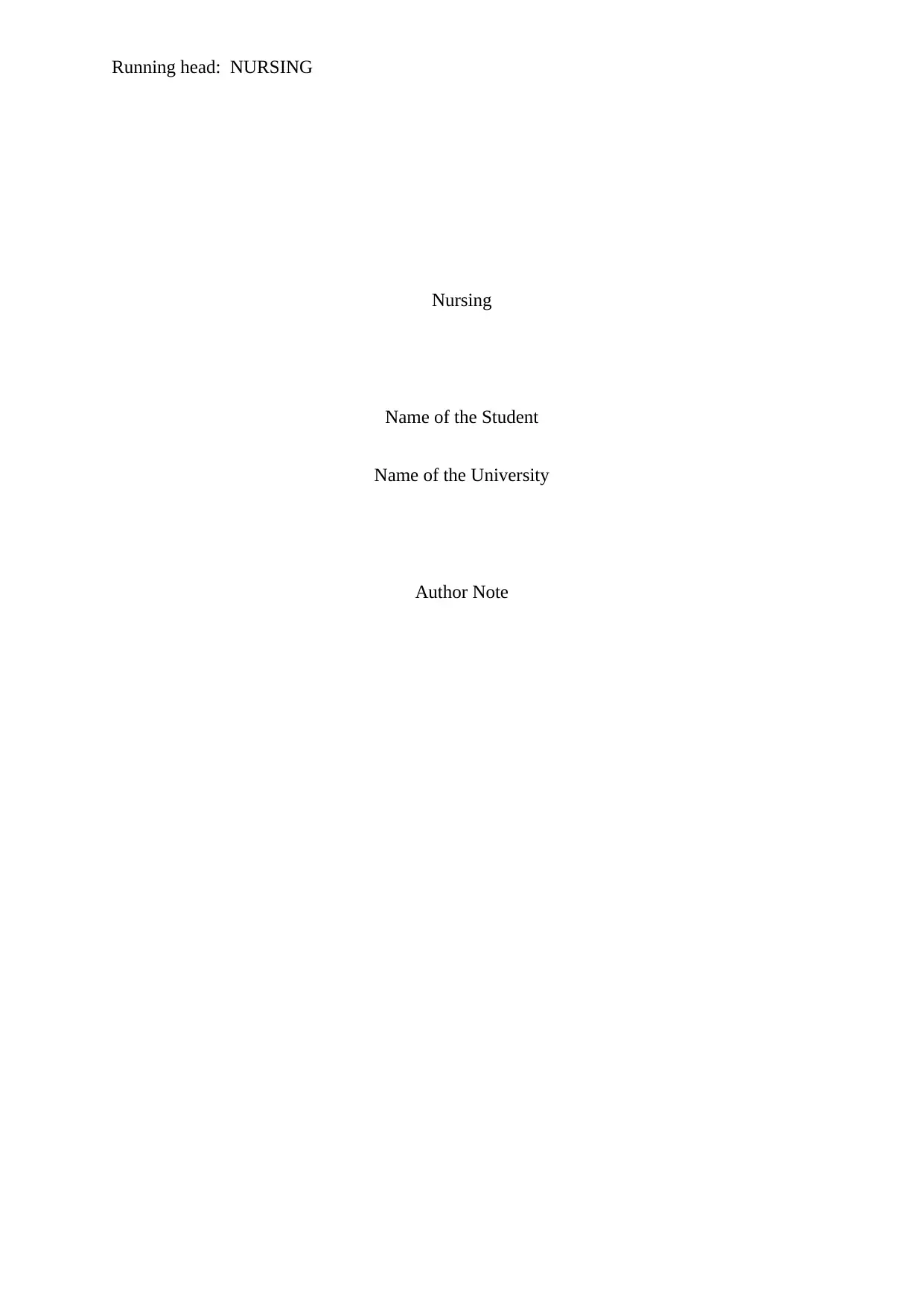
Running head: NURSING
Nursing
Name of the Student
Name of the University
Author Note
Nursing
Name of the Student
Name of the University
Author Note
Paraphrase This Document
Need a fresh take? Get an instant paraphrase of this document with our AI Paraphraser
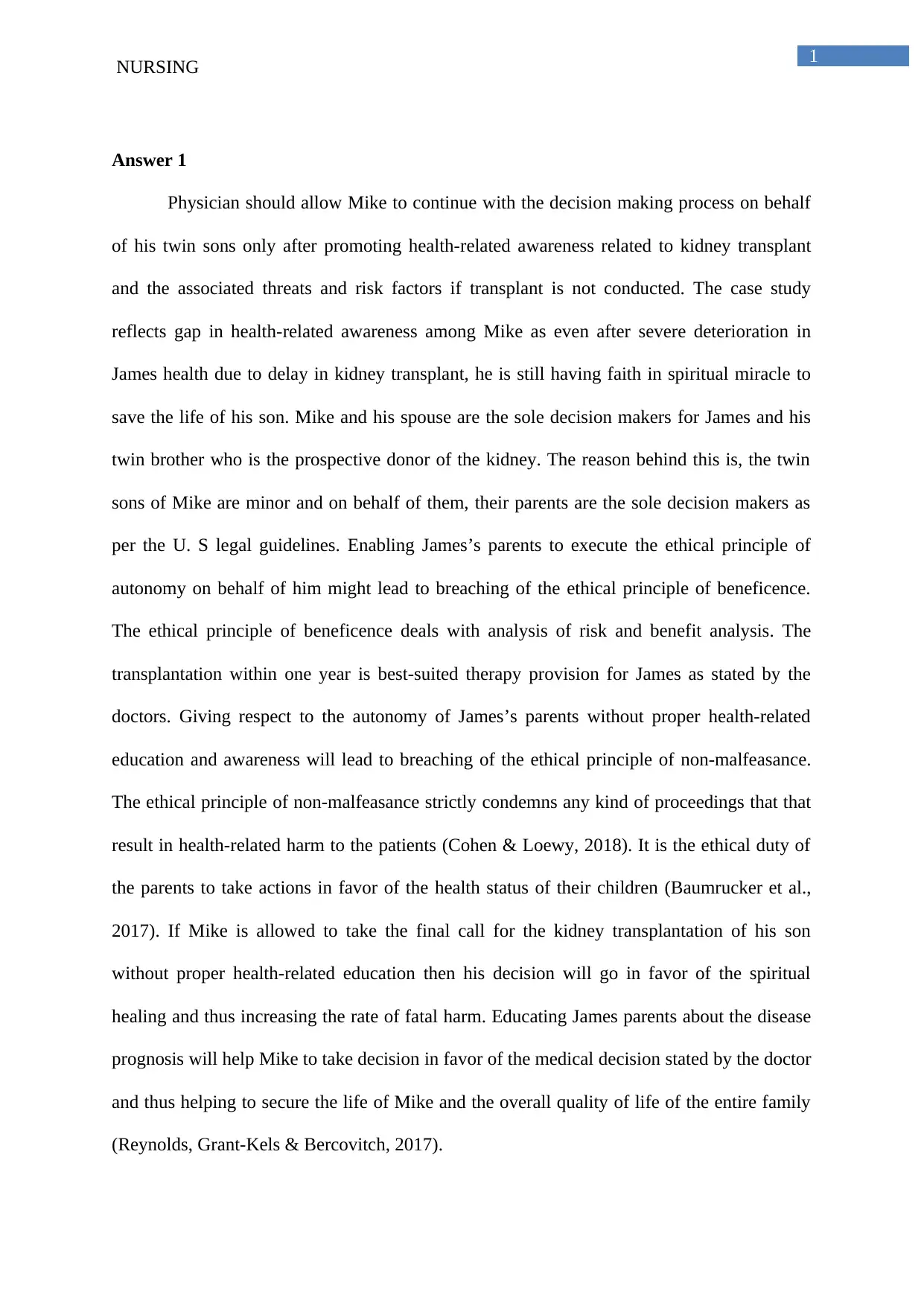
1
NURSING
Answer 1
Physician should allow Mike to continue with the decision making process on behalf
of his twin sons only after promoting health-related awareness related to kidney transplant
and the associated threats and risk factors if transplant is not conducted. The case study
reflects gap in health-related awareness among Mike as even after severe deterioration in
James health due to delay in kidney transplant, he is still having faith in spiritual miracle to
save the life of his son. Mike and his spouse are the sole decision makers for James and his
twin brother who is the prospective donor of the kidney. The reason behind this is, the twin
sons of Mike are minor and on behalf of them, their parents are the sole decision makers as
per the U. S legal guidelines. Enabling James’s parents to execute the ethical principle of
autonomy on behalf of him might lead to breaching of the ethical principle of beneficence.
The ethical principle of beneficence deals with analysis of risk and benefit analysis. The
transplantation within one year is best-suited therapy provision for James as stated by the
doctors. Giving respect to the autonomy of James’s parents without proper health-related
education and awareness will lead to breaching of the ethical principle of non-malfeasance.
The ethical principle of non-malfeasance strictly condemns any kind of proceedings that that
result in health-related harm to the patients (Cohen & Loewy, 2018). It is the ethical duty of
the parents to take actions in favor of the health status of their children (Baumrucker et al.,
2017). If Mike is allowed to take the final call for the kidney transplantation of his son
without proper health-related education then his decision will go in favor of the spiritual
healing and thus increasing the rate of fatal harm. Educating James parents about the disease
prognosis will help Mike to take decision in favor of the medical decision stated by the doctor
and thus helping to secure the life of Mike and the overall quality of life of the entire family
(Reynolds, Grant-Kels & Bercovitch, 2017).
NURSING
Answer 1
Physician should allow Mike to continue with the decision making process on behalf
of his twin sons only after promoting health-related awareness related to kidney transplant
and the associated threats and risk factors if transplant is not conducted. The case study
reflects gap in health-related awareness among Mike as even after severe deterioration in
James health due to delay in kidney transplant, he is still having faith in spiritual miracle to
save the life of his son. Mike and his spouse are the sole decision makers for James and his
twin brother who is the prospective donor of the kidney. The reason behind this is, the twin
sons of Mike are minor and on behalf of them, their parents are the sole decision makers as
per the U. S legal guidelines. Enabling James’s parents to execute the ethical principle of
autonomy on behalf of him might lead to breaching of the ethical principle of beneficence.
The ethical principle of beneficence deals with analysis of risk and benefit analysis. The
transplantation within one year is best-suited therapy provision for James as stated by the
doctors. Giving respect to the autonomy of James’s parents without proper health-related
education and awareness will lead to breaching of the ethical principle of non-malfeasance.
The ethical principle of non-malfeasance strictly condemns any kind of proceedings that that
result in health-related harm to the patients (Cohen & Loewy, 2018). It is the ethical duty of
the parents to take actions in favor of the health status of their children (Baumrucker et al.,
2017). If Mike is allowed to take the final call for the kidney transplantation of his son
without proper health-related education then his decision will go in favor of the spiritual
healing and thus increasing the rate of fatal harm. Educating James parents about the disease
prognosis will help Mike to take decision in favor of the medical decision stated by the doctor
and thus helping to secure the life of Mike and the overall quality of life of the entire family
(Reynolds, Grant-Kels & Bercovitch, 2017).
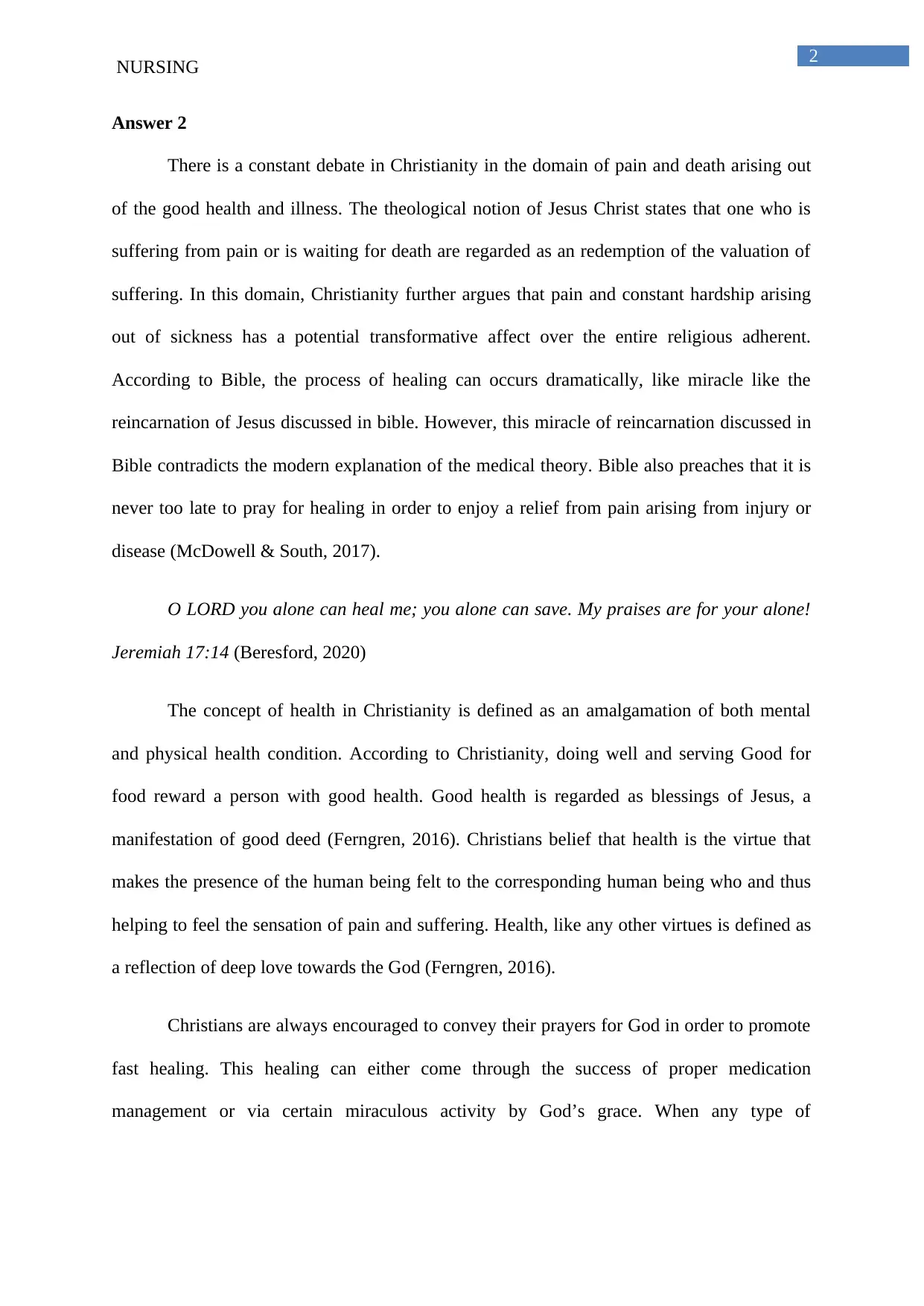
2
NURSING
Answer 2
There is a constant debate in Christianity in the domain of pain and death arising out
of the good health and illness. The theological notion of Jesus Christ states that one who is
suffering from pain or is waiting for death are regarded as an redemption of the valuation of
suffering. In this domain, Christianity further argues that pain and constant hardship arising
out of sickness has a potential transformative affect over the entire religious adherent.
According to Bible, the process of healing can occurs dramatically, like miracle like the
reincarnation of Jesus discussed in bible. However, this miracle of reincarnation discussed in
Bible contradicts the modern explanation of the medical theory. Bible also preaches that it is
never too late to pray for healing in order to enjoy a relief from pain arising from injury or
disease (McDowell & South, 2017).
O LORD you alone can heal me; you alone can save. My praises are for your alone!
Jeremiah 17:14 (Beresford, 2020)
The concept of health in Christianity is defined as an amalgamation of both mental
and physical health condition. According to Christianity, doing well and serving Good for
food reward a person with good health. Good health is regarded as blessings of Jesus, a
manifestation of good deed (Ferngren, 2016). Christians belief that health is the virtue that
makes the presence of the human being felt to the corresponding human being who and thus
helping to feel the sensation of pain and suffering. Health, like any other virtues is defined as
a reflection of deep love towards the God (Ferngren, 2016).
Christians are always encouraged to convey their prayers for God in order to promote
fast healing. This healing can either come through the success of proper medication
management or via certain miraculous activity by God’s grace. When any type of
NURSING
Answer 2
There is a constant debate in Christianity in the domain of pain and death arising out
of the good health and illness. The theological notion of Jesus Christ states that one who is
suffering from pain or is waiting for death are regarded as an redemption of the valuation of
suffering. In this domain, Christianity further argues that pain and constant hardship arising
out of sickness has a potential transformative affect over the entire religious adherent.
According to Bible, the process of healing can occurs dramatically, like miracle like the
reincarnation of Jesus discussed in bible. However, this miracle of reincarnation discussed in
Bible contradicts the modern explanation of the medical theory. Bible also preaches that it is
never too late to pray for healing in order to enjoy a relief from pain arising from injury or
disease (McDowell & South, 2017).
O LORD you alone can heal me; you alone can save. My praises are for your alone!
Jeremiah 17:14 (Beresford, 2020)
The concept of health in Christianity is defined as an amalgamation of both mental
and physical health condition. According to Christianity, doing well and serving Good for
food reward a person with good health. Good health is regarded as blessings of Jesus, a
manifestation of good deed (Ferngren, 2016). Christians belief that health is the virtue that
makes the presence of the human being felt to the corresponding human being who and thus
helping to feel the sensation of pain and suffering. Health, like any other virtues is defined as
a reflection of deep love towards the God (Ferngren, 2016).
Christians are always encouraged to convey their prayers for God in order to promote
fast healing. This healing can either come through the success of proper medication
management or via certain miraculous activity by God’s grace. When any type of
⊘ This is a preview!⊘
Do you want full access?
Subscribe today to unlock all pages.

Trusted by 1+ million students worldwide
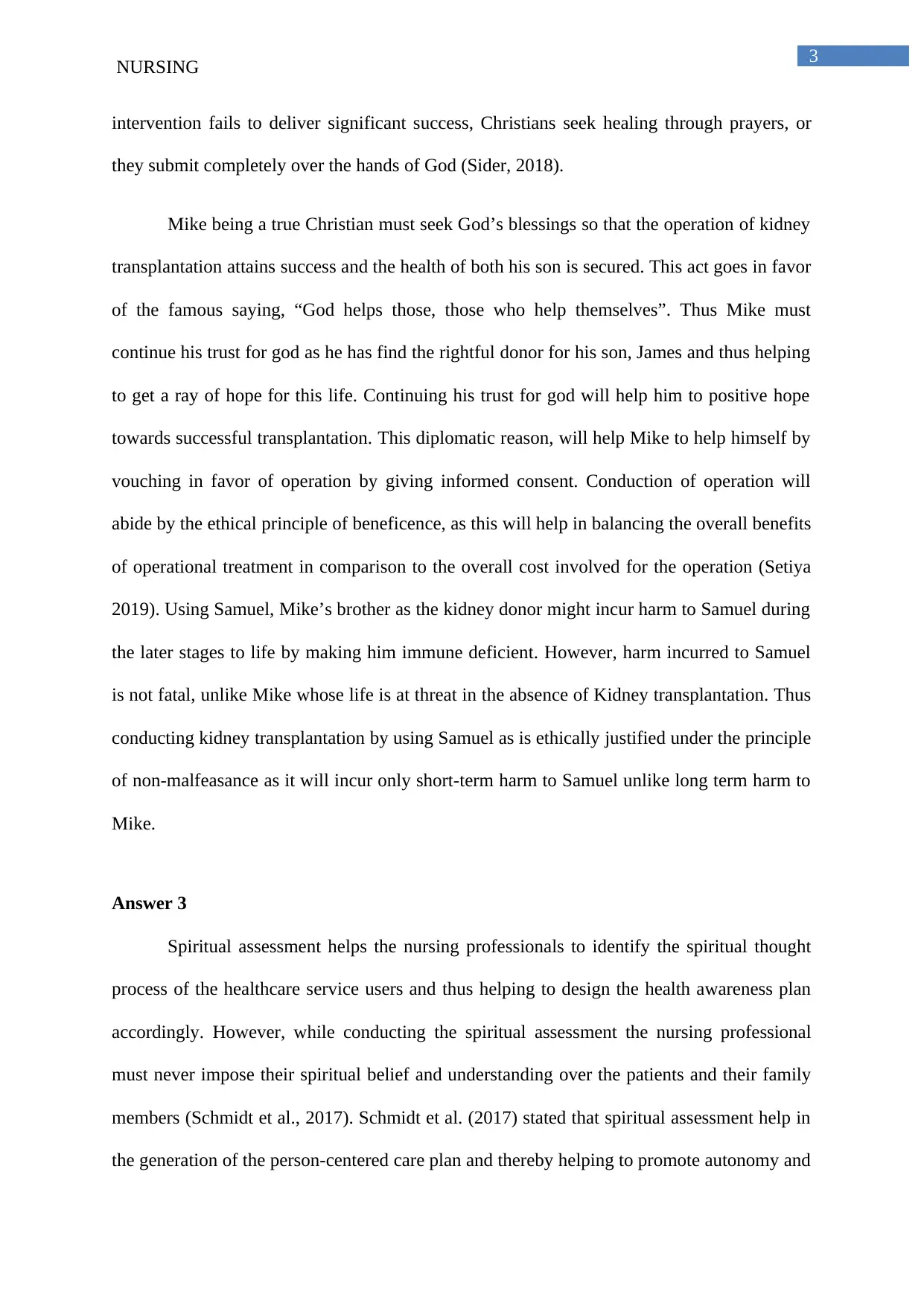
3
NURSING
intervention fails to deliver significant success, Christians seek healing through prayers, or
they submit completely over the hands of God (Sider, 2018).
Mike being a true Christian must seek God’s blessings so that the operation of kidney
transplantation attains success and the health of both his son is secured. This act goes in favor
of the famous saying, “God helps those, those who help themselves”. Thus Mike must
continue his trust for god as he has find the rightful donor for his son, James and thus helping
to get a ray of hope for this life. Continuing his trust for god will help him to positive hope
towards successful transplantation. This diplomatic reason, will help Mike to help himself by
vouching in favor of operation by giving informed consent. Conduction of operation will
abide by the ethical principle of beneficence, as this will help in balancing the overall benefits
of operational treatment in comparison to the overall cost involved for the operation (Setiya
2019). Using Samuel, Mike’s brother as the kidney donor might incur harm to Samuel during
the later stages to life by making him immune deficient. However, harm incurred to Samuel
is not fatal, unlike Mike whose life is at threat in the absence of Kidney transplantation. Thus
conducting kidney transplantation by using Samuel as is ethically justified under the principle
of non-malfeasance as it will incur only short-term harm to Samuel unlike long term harm to
Mike.
Answer 3
Spiritual assessment helps the nursing professionals to identify the spiritual thought
process of the healthcare service users and thus helping to design the health awareness plan
accordingly. However, while conducting the spiritual assessment the nursing professional
must never impose their spiritual belief and understanding over the patients and their family
members (Schmidt et al., 2017). Schmidt et al. (2017) stated that spiritual assessment help in
the generation of the person-centered care plan and thereby helping to promote autonomy and
NURSING
intervention fails to deliver significant success, Christians seek healing through prayers, or
they submit completely over the hands of God (Sider, 2018).
Mike being a true Christian must seek God’s blessings so that the operation of kidney
transplantation attains success and the health of both his son is secured. This act goes in favor
of the famous saying, “God helps those, those who help themselves”. Thus Mike must
continue his trust for god as he has find the rightful donor for his son, James and thus helping
to get a ray of hope for this life. Continuing his trust for god will help him to positive hope
towards successful transplantation. This diplomatic reason, will help Mike to help himself by
vouching in favor of operation by giving informed consent. Conduction of operation will
abide by the ethical principle of beneficence, as this will help in balancing the overall benefits
of operational treatment in comparison to the overall cost involved for the operation (Setiya
2019). Using Samuel, Mike’s brother as the kidney donor might incur harm to Samuel during
the later stages to life by making him immune deficient. However, harm incurred to Samuel
is not fatal, unlike Mike whose life is at threat in the absence of Kidney transplantation. Thus
conducting kidney transplantation by using Samuel as is ethically justified under the principle
of non-malfeasance as it will incur only short-term harm to Samuel unlike long term harm to
Mike.
Answer 3
Spiritual assessment helps the nursing professionals to identify the spiritual thought
process of the healthcare service users and thus helping to design the health awareness plan
accordingly. However, while conducting the spiritual assessment the nursing professional
must never impose their spiritual belief and understanding over the patients and their family
members (Schmidt et al., 2017). Schmidt et al. (2017) stated that spiritual assessment help in
the generation of the person-centered care plan and thereby helping to promote autonomy and
Paraphrase This Document
Need a fresh take? Get an instant paraphrase of this document with our AI Paraphraser
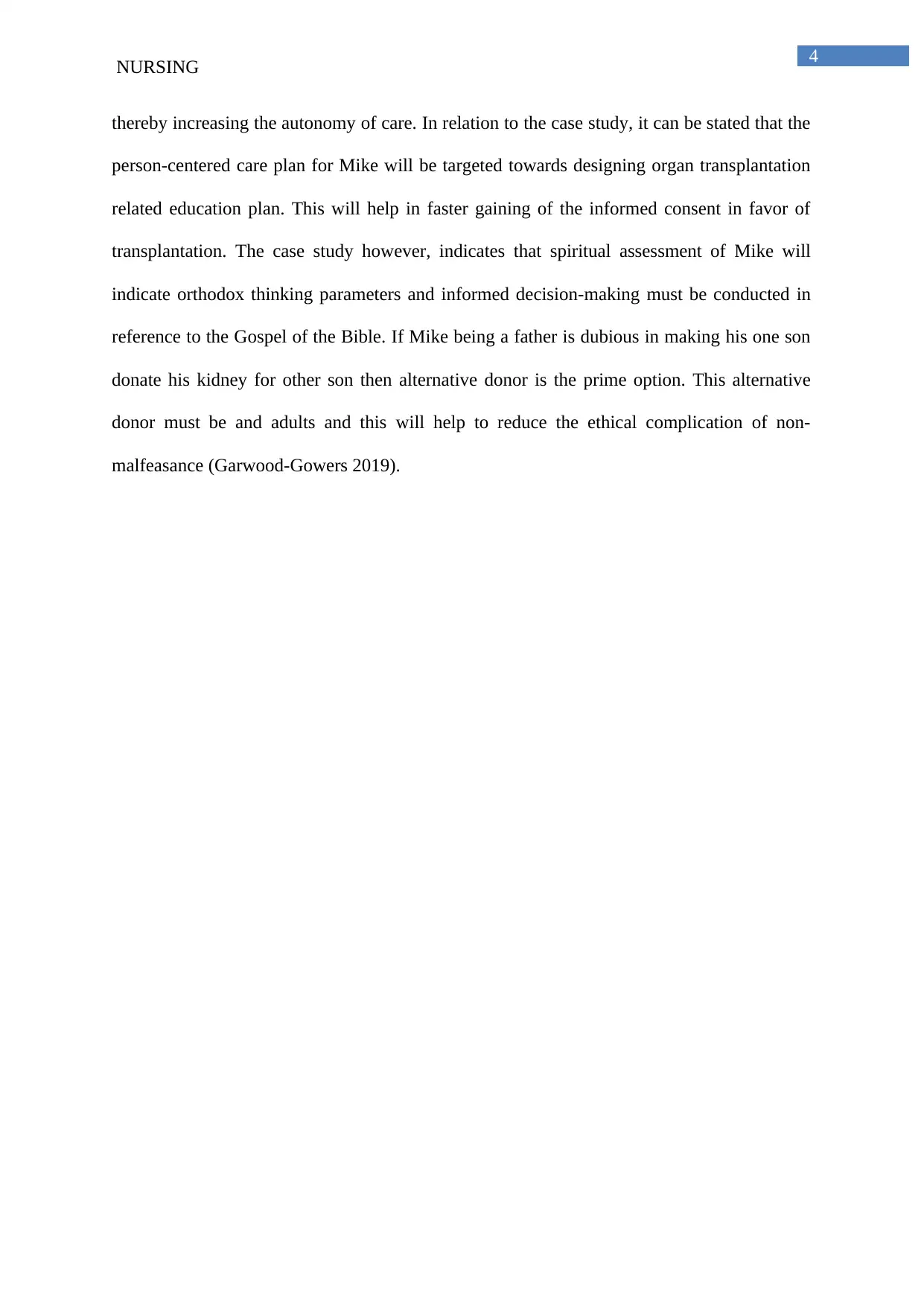
4
NURSING
thereby increasing the autonomy of care. In relation to the case study, it can be stated that the
person-centered care plan for Mike will be targeted towards designing organ transplantation
related education plan. This will help in faster gaining of the informed consent in favor of
transplantation. The case study however, indicates that spiritual assessment of Mike will
indicate orthodox thinking parameters and informed decision-making must be conducted in
reference to the Gospel of the Bible. If Mike being a father is dubious in making his one son
donate his kidney for other son then alternative donor is the prime option. This alternative
donor must be and adults and this will help to reduce the ethical complication of non-
malfeasance (Garwood-Gowers 2019).
NURSING
thereby increasing the autonomy of care. In relation to the case study, it can be stated that the
person-centered care plan for Mike will be targeted towards designing organ transplantation
related education plan. This will help in faster gaining of the informed consent in favor of
transplantation. The case study however, indicates that spiritual assessment of Mike will
indicate orthodox thinking parameters and informed decision-making must be conducted in
reference to the Gospel of the Bible. If Mike being a father is dubious in making his one son
donate his kidney for other son then alternative donor is the prime option. This alternative
donor must be and adults and this will help to reduce the ethical complication of non-
malfeasance (Garwood-Gowers 2019).
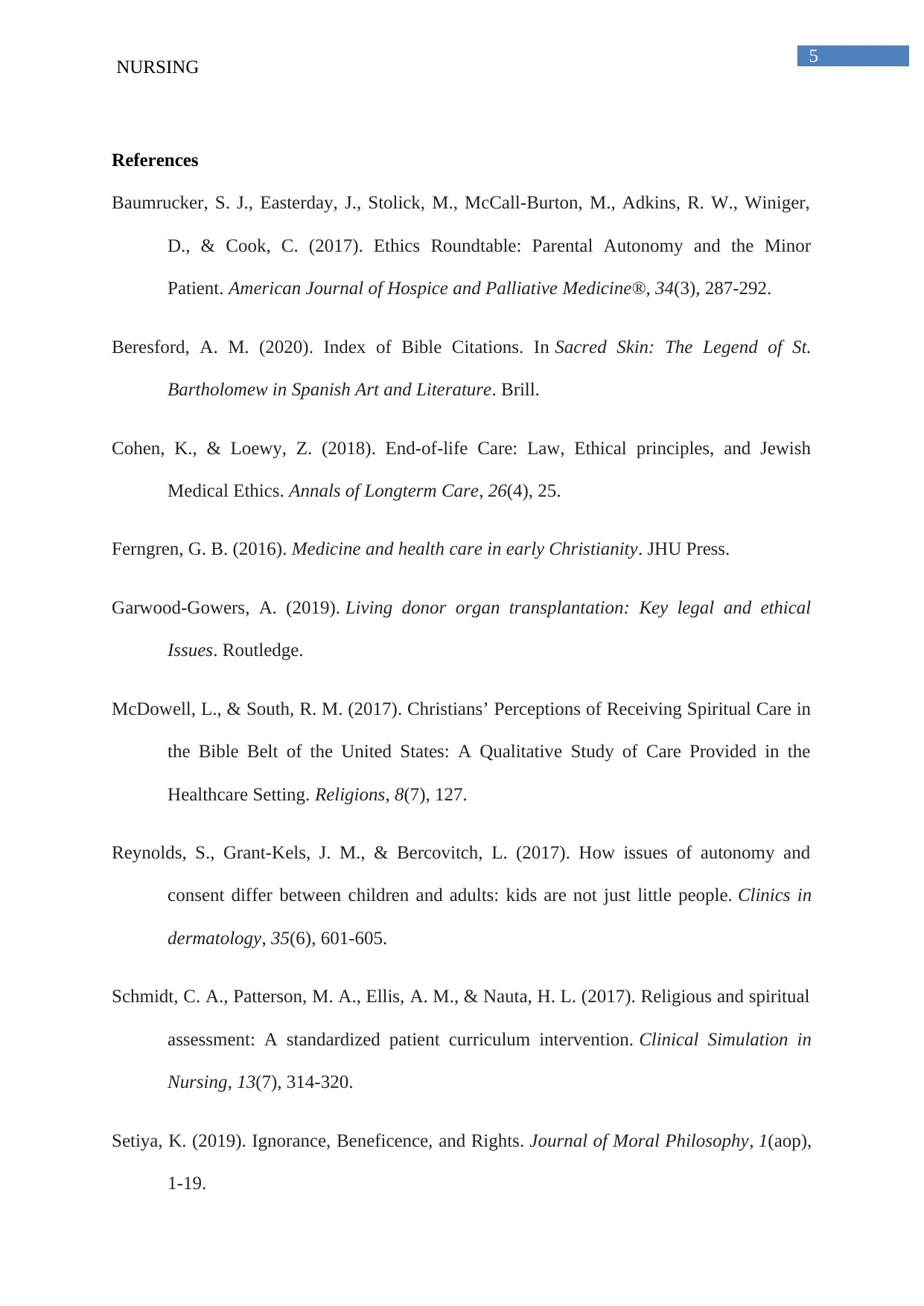
5
NURSING
References
Baumrucker, S. J., Easterday, J., Stolick, M., McCall-Burton, M., Adkins, R. W., Winiger,
D., & Cook, C. (2017). Ethics Roundtable: Parental Autonomy and the Minor
Patient. American Journal of Hospice and Palliative Medicine®, 34(3), 287-292.
Beresford, A. M. (2020). Index of Bible Citations. In Sacred Skin: The Legend of St.
Bartholomew in Spanish Art and Literature. Brill.
Cohen, K., & Loewy, Z. (2018). End-of-life Care: Law, Ethical principles, and Jewish
Medical Ethics. Annals of Longterm Care, 26(4), 25.
Ferngren, G. B. (2016). Medicine and health care in early Christianity. JHU Press.
Garwood-Gowers, A. (2019). Living donor organ transplantation: Key legal and ethical
Issues. Routledge.
McDowell, L., & South, R. M. (2017). Christians’ Perceptions of Receiving Spiritual Care in
the Bible Belt of the United States: A Qualitative Study of Care Provided in the
Healthcare Setting. Religions, 8(7), 127.
Reynolds, S., Grant-Kels, J. M., & Bercovitch, L. (2017). How issues of autonomy and
consent differ between children and adults: kids are not just little people. Clinics in
dermatology, 35(6), 601-605.
Schmidt, C. A., Patterson, M. A., Ellis, A. M., & Nauta, H. L. (2017). Religious and spiritual
assessment: A standardized patient curriculum intervention. Clinical Simulation in
Nursing, 13(7), 314-320.
Setiya, K. (2019). Ignorance, Beneficence, and Rights. Journal of Moral Philosophy, 1(aop),
1-19.
NURSING
References
Baumrucker, S. J., Easterday, J., Stolick, M., McCall-Burton, M., Adkins, R. W., Winiger,
D., & Cook, C. (2017). Ethics Roundtable: Parental Autonomy and the Minor
Patient. American Journal of Hospice and Palliative Medicine®, 34(3), 287-292.
Beresford, A. M. (2020). Index of Bible Citations. In Sacred Skin: The Legend of St.
Bartholomew in Spanish Art and Literature. Brill.
Cohen, K., & Loewy, Z. (2018). End-of-life Care: Law, Ethical principles, and Jewish
Medical Ethics. Annals of Longterm Care, 26(4), 25.
Ferngren, G. B. (2016). Medicine and health care in early Christianity. JHU Press.
Garwood-Gowers, A. (2019). Living donor organ transplantation: Key legal and ethical
Issues. Routledge.
McDowell, L., & South, R. M. (2017). Christians’ Perceptions of Receiving Spiritual Care in
the Bible Belt of the United States: A Qualitative Study of Care Provided in the
Healthcare Setting. Religions, 8(7), 127.
Reynolds, S., Grant-Kels, J. M., & Bercovitch, L. (2017). How issues of autonomy and
consent differ between children and adults: kids are not just little people. Clinics in
dermatology, 35(6), 601-605.
Schmidt, C. A., Patterson, M. A., Ellis, A. M., & Nauta, H. L. (2017). Religious and spiritual
assessment: A standardized patient curriculum intervention. Clinical Simulation in
Nursing, 13(7), 314-320.
Setiya, K. (2019). Ignorance, Beneficence, and Rights. Journal of Moral Philosophy, 1(aop),
1-19.
⊘ This is a preview!⊘
Do you want full access?
Subscribe today to unlock all pages.

Trusted by 1+ million students worldwide
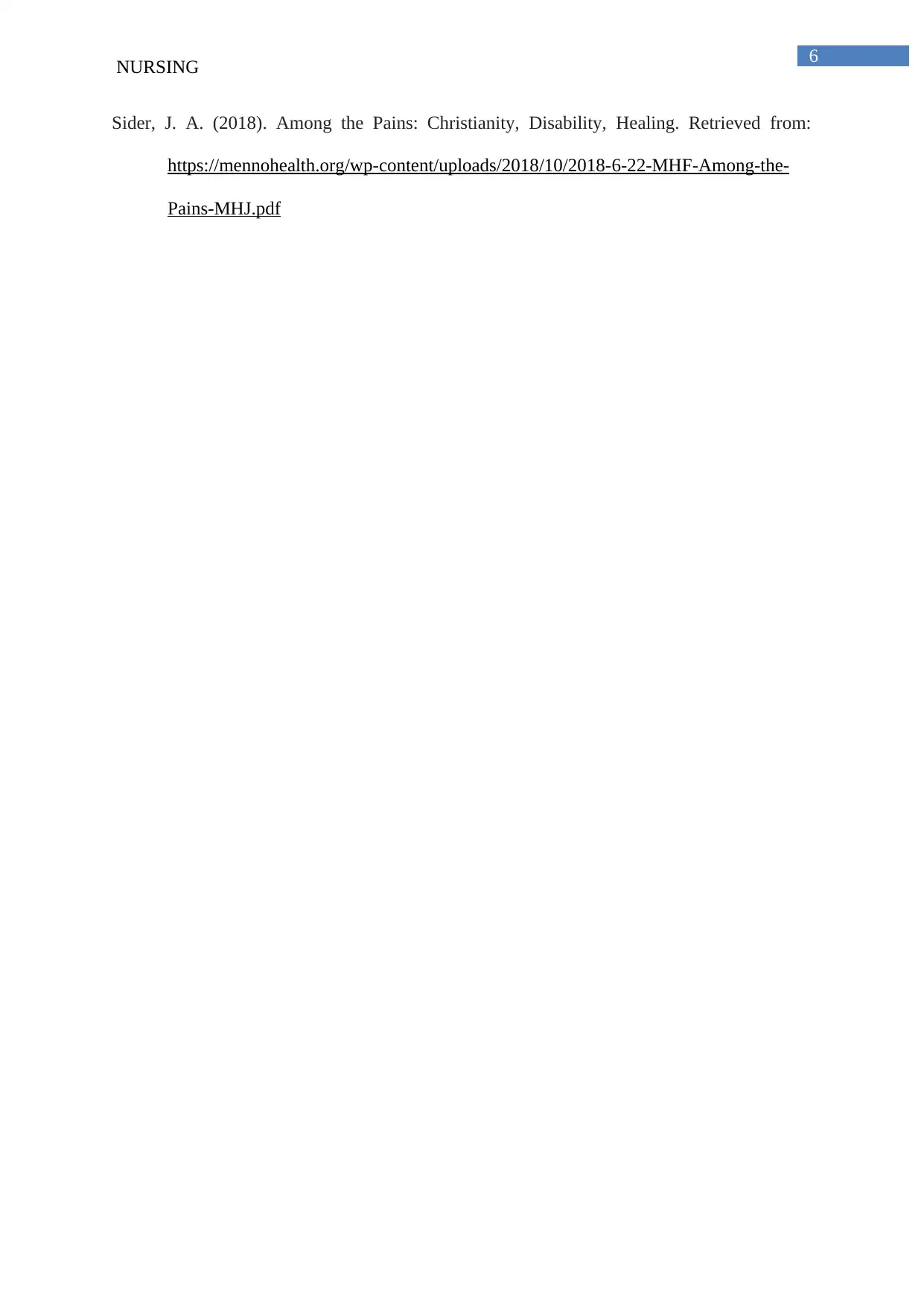
6
NURSING
Sider, J. A. (2018). Among the Pains: Christianity, Disability, Healing. Retrieved from:
https://mennohealth.org/wp-content/uploads/2018/10/2018-6-22-MHF-Among-the-
Pains-MHJ.pdf
NURSING
Sider, J. A. (2018). Among the Pains: Christianity, Disability, Healing. Retrieved from:
https://mennohealth.org/wp-content/uploads/2018/10/2018-6-22-MHF-Among-the-
Pains-MHJ.pdf
1 out of 7
Related Documents
Your All-in-One AI-Powered Toolkit for Academic Success.
+13062052269
info@desklib.com
Available 24*7 on WhatsApp / Email
![[object Object]](/_next/static/media/star-bottom.7253800d.svg)
Unlock your academic potential
Copyright © 2020–2026 A2Z Services. All Rights Reserved. Developed and managed by ZUCOL.





